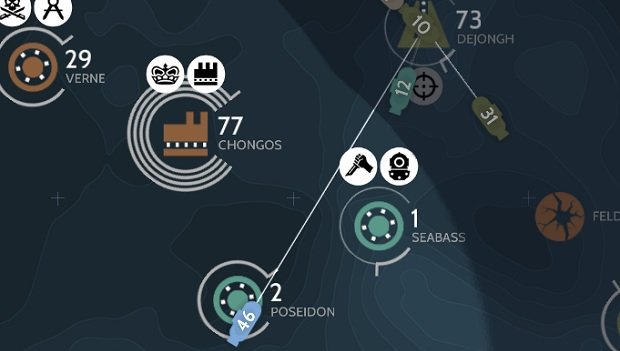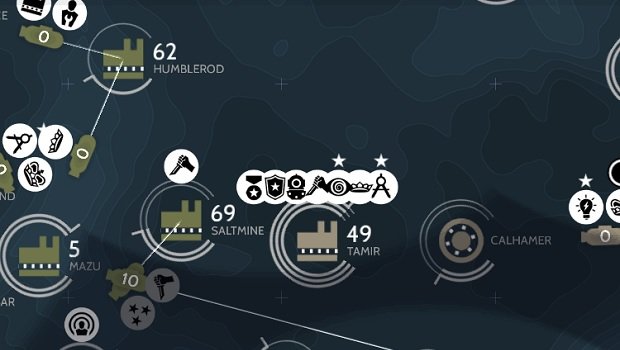Submarines, strategy, and sabotage - You should be playing Subterfuge
I hate myself right now. One of my friends is frantically sending me messages in Subterfuge, asking me to help him out against another player. He just needs a couple dozen drillers from one of my outposts to strike back against an oncoming attack - but I'm ignoring him. Little does he know that I actually made an alliance with his attacker a few hours prior - an alliance I plan on breaking as soon as I build my forces up a little bit more.

Subterfuge is a real-time mobile strategy game with a massive amount of depth, but the rules are actually pretty simple. One player creates a game and determines the number of players, either sending direct invitations to friends, or allowing random players to fill out the roster. Each player starts with five outposts - a mixture of factories (which build drillers) and generators (which power your drillers and factories) - and a Queen (which allows you to hire rule-breaking Specialists). Once everyone joins, a countdown begins, allowing players four hours to make their first move and negotiate with other players before the game officially starts. Once the game begins, time begins flowing, and moves begin to play out while your factories produce more drillers, which you can use to attack other players' outposts. Attacking involves simple math - you take the number of your drillers and subtract the number of drillers your opponent has (plus any shields, if applicable), and the higher number wins. Amassing a certain number of drillers at an outpost allows you to cash in those drillers and turn that outpost into a mine, which produces Neptunium. The first player to reach 200 Neptunium (or the last player with a Queen still in the game) is the winner.
It seems easy enough to grasp, until you realize that a single game of Subterfuge can take weeks to finish. Sending drillers from one outpost to another doesn't take minutes - it takes hours, sometimes days to play out. New drillers are built every couple of hours and new Specialists are unlocked every 18 hours. This forces you to constantly think about how you're going to plan your moves, sometimes days ahead of time, because you are never safe from a potential assault. Luckily, you can schedule an unlimited amount of moves for any time of day in order to set up waves of attacks, or to catch your opponent unaware - but your rivals can do the exact same thing. It's common to wake up in the morning and find that an armada of drillers has made it halfway to one of your outposts while you were sleeping, leaving you with little time to properly counter their advance. And because the game exists on mobile devices, you are constantly in the thick of it, receiving updates on player movements thanks to your outposts' sonar range and the messages you receive from your opponents/teammates/future victims.

Hopefully, you've been communicating with other players this whole time, and are able to rally them to help you recapture your lost outposts or go on the offensive against other players. It sounds like a small addition - Subterfuge basically implements a handful of chat room options in-game - but communication is the game, and to ignore it is to already admit defeat. When a game starts, there are dozens of unoccupied outposts on the map, and players are encouraged to talk with each other to figure out which ones they're going to snag without getting involved in unnecessary conflict. This allows you to build a rapport with your competitors, to forge alliances, gather intel, and determine who you're gunning for. You can talk with other players to find out how many drillers an opponent has lurking at an outpost outside your sonar range, or discuss coordinating your attacks against a troublesome foe, or arrange for a diversion to get an attacking player off your back for a bit. This is all handled organically, though - you won't go to a 'treaty' menu to manage your alliance or set them for a specific amount of time, so there's no telling if a player will actually do whatever they agreed to do, or if what they're telling you is true. Everything is done through direct communication, which means that there are no systems in place to put a buffer between you and your own guilt when you finally decide to stab your friends in the back for personal gain.
When you combine the real-time, drawn out conflict with its emphasis on communication with other players, you get a strategy game that's like no other. Really, the mechanics of the actual game bits are a small part of the overall package in comparison to the larger meta-game between players, which is what makes Subterfuge so fascinating. By focusing on the interpersonal relationships above all, every skirmish feels personal, every victory feels earned - it just takes a hell of a lot of conniving and betrayal to get there. There's also a good chance that the conflict starts to bleed out into the real world, as you send tweets to players in secret in order to plot someone else's destruction, or ask friends who aren't playing to see if they'll give you hints based on their conversations with your opponents. Don't feel too bad about it - your rivals are probably doing the same thing, because Subterfuge turns you into the worst kind of person.

This is Subterfuge. It seeps into your daily routine, becoming a very intense obsession, forming a dark, heavy cloud that hangs over a real-time week or two of your life. I hate it. I hate the way it makes me feel; the way it gives me anxiety; the way it forces me to turn against my friends; the way that it gets into my every waking thought, where going to sleep at the end of the day no longer provides the relief it once did. But I can't stop - it may just be the best multiplayer strategy game I've ever played.
Weekly digests, tales from the communities you love, and more



